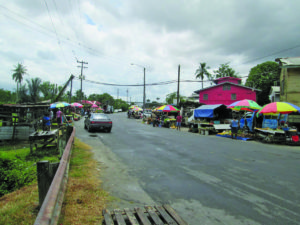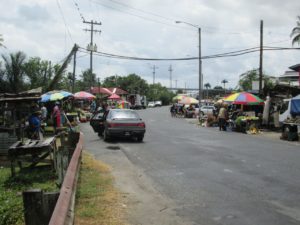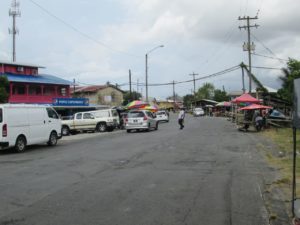 “Two packs sausage fuh $500.” “Come get yuh bora, fresh garden bora.” “I got nice tops fuh yuh wife, bai; come buy two.” These are some of the words one would hear on passing through what was once the busiest place on the West Bank of Demerara on Friday. That place was the Wales Market, but now the once-busy area is a ghost town with very few vendors on a Friday.
“Two packs sausage fuh $500.” “Come get yuh bora, fresh garden bora.” “I got nice tops fuh yuh wife, bai; come buy two.” These are some of the words one would hear on passing through what was once the busiest place on the West Bank of Demerara on Friday. That place was the Wales Market, but now the once-busy area is a ghost town with very few vendors on a Friday.
“Right now, what I can tell you, this market is a dead place. Almost everybody stop coming to sell, since the estate close down, because it was mostly the estate workers who used to buy and now them people nah got money, so they got to economise and business too bad to still sell deh,” former vendor Hemraj Mangru said. But how did the once-busy market become a virtual ghost town? The answer presents itself right before you: the closure, in 2016, of the Wales Estate, the largest employer on the West Bank of Demerara. It has been almost two years since the closure, and former workers are still trying to find employment, while the economy of the village and those further afield are still grappling with the economic shock.
Businesses are continuing to see a decline in sales, since most of the people are economising – cutting back on spending not because they want to, but because they are forced to. Many of the workers who lost their jobs at the estate are high school dropouts or those who never went to school thus making the task of finding employment ten times harder.  When the
When the
Administration decided to close the estate, it did not come up with an alternative plan to cushion the effect of the massive shock to the economy. Apart from offering some of the workers employment at the Uitvlugt Estate, West Coast Demerara, there was no contingency plan and the workers were virtually given no options as to how to go about getting jobs.
Most of them attempted to join the fisheries sector, applying to various fish/seafood processing plants, but very few were successful. Those who know to read and write a bit were given employment with various security services, but those employed by Sentinel Security Service had to protest for their salaries, since they were forced to go unpaid for months.  “When you do get your pay, then it short and them does bring some ‘Jim cock bring ram goat’ story and tell you how hours short and all kind of thing, but we can’t say nothing because we need the money. We punishing, budday; this life nah easy at all,” one of the former estate workers, now a security officer, said.
“When you do get your pay, then it short and them does bring some ‘Jim cock bring ram goat’ story and tell you how hours short and all kind of thing, but we can’t say nothing because we need the money. We punishing, budday; this life nah easy at all,” one of the former estate workers, now a security officer, said.
 Not underplaying the struggles of the retrenched workers, but back to the issue of the dying institution that is the Wales Market. The vendors said that after the closure of the estate, they attempted to continue vending there, but it was not the same and over time they were forced to pack up shop and look for alternative markets, since the income of most residents has all but vanished.
Not underplaying the struggles of the retrenched workers, but back to the issue of the dying institution that is the Wales Market. The vendors said that after the closure of the estate, they attempted to continue vending there, but it was not the same and over time they were forced to pack up shop and look for alternative markets, since the income of most residents has all but vanished.
Now on a Friday, the streets are virtually clear and there is no shouting of bargains to entice customers. There is no competition because there are no estate workers with their week’s earnings to spend. The vendors are suffering, the former workers are suffering, the community of Wales is suffering, and, by extension, the entire West Bank of Demerara is suffering.
(Times Sunday Magazine)



